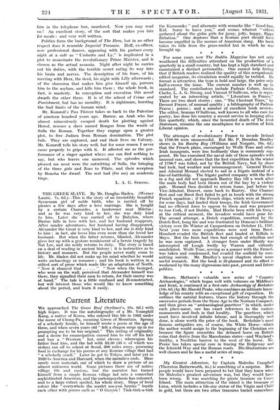Current Literature
wE approached The Grass Roof (Scribner's, 10s. 6d.) with high hopes. It was the autobiography of a Mr. Younghill Hang, a native of Korea, who entered this life in 1903 under the name of Chung-Pa, meaning Green of Mountain. Sprung of a scholarly family, he himself wrote a poem at the age of three, and when seven years old" felt a dragon surge up. in me prompting me to be too original." This feeling of originality and a desire for emancipation caused him to cut off his hair and buy a " Western " hat, aetat. eleven ; whereupon his father beat him, and the lad with $3.30 (30 c. of which was stolen) ran off to school at Seoul, 300 miles away, procuring food in exchange for his poems at any Korean village that had "a scholarly smell." Later he got to Tokyo, and later yet in 1920 to America and Harvard, when the narrative ends. Here surely were materials out of which to draw a picture of an almost unknown world. Some pictures there are of native village life and custom, but the narrator has turned himself from a simple Korean village lad into a somewhat sophisticated American, and the metempsychosis has coloured, and to a large extent spoiled, his whole story. Slops of local colour like everywhere the scarlet soo-yoo berries" hustle each other with poems such as "0 Garcon! Tink-tink-a-tink
the Kumoonko " and alternate with remarks like "Good-bye, Kid. Sorry to leave you," and scenes whereat "others gathered about the gisha girls for jazzy, jolly, happy, Hippy flirtation." One deplores that a Korean poet should have become engulfed in the morass of American slang. His book takes its title from the grass-roofed hut in which he was brought up.






























 Previous page
Previous page